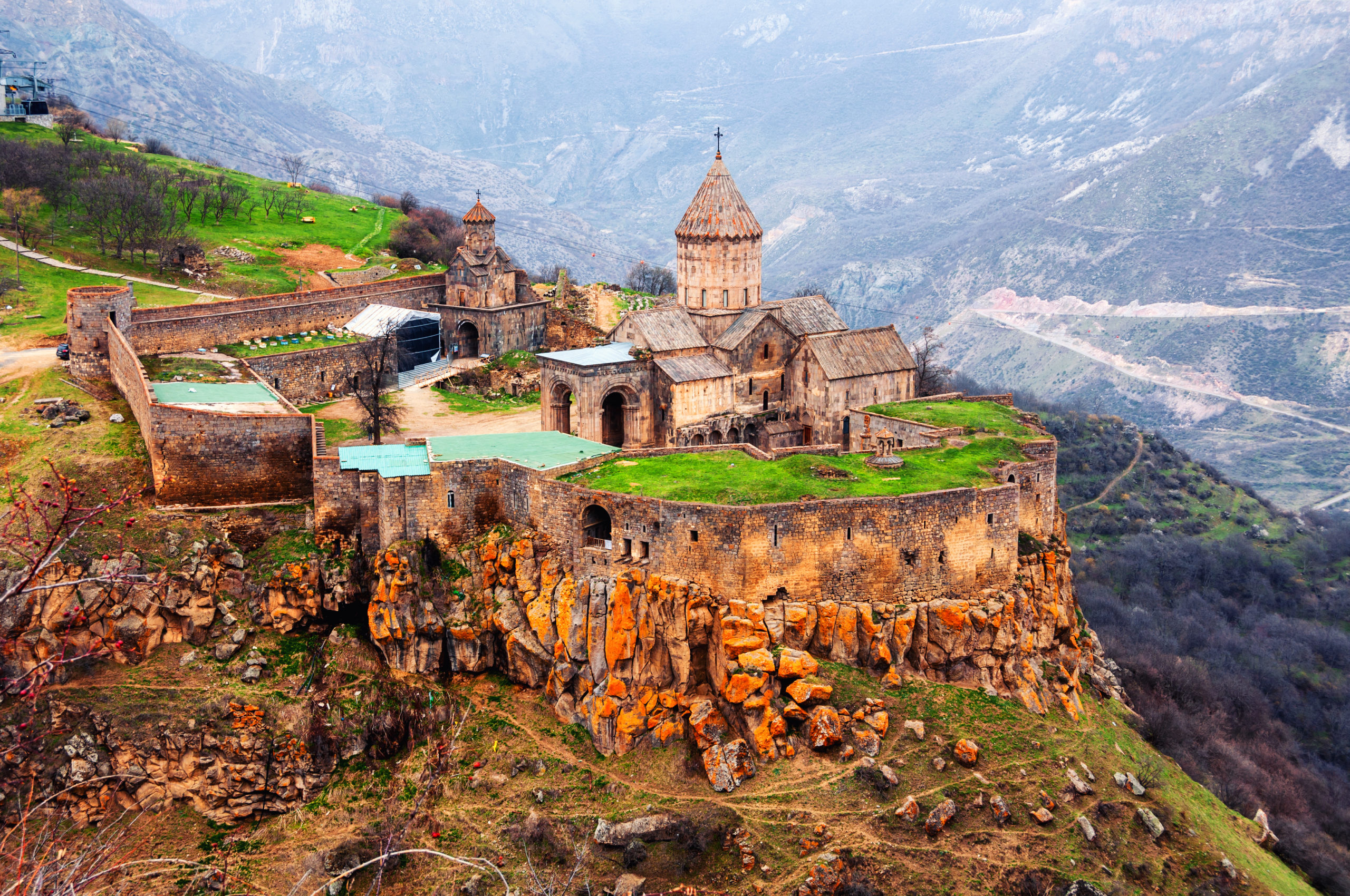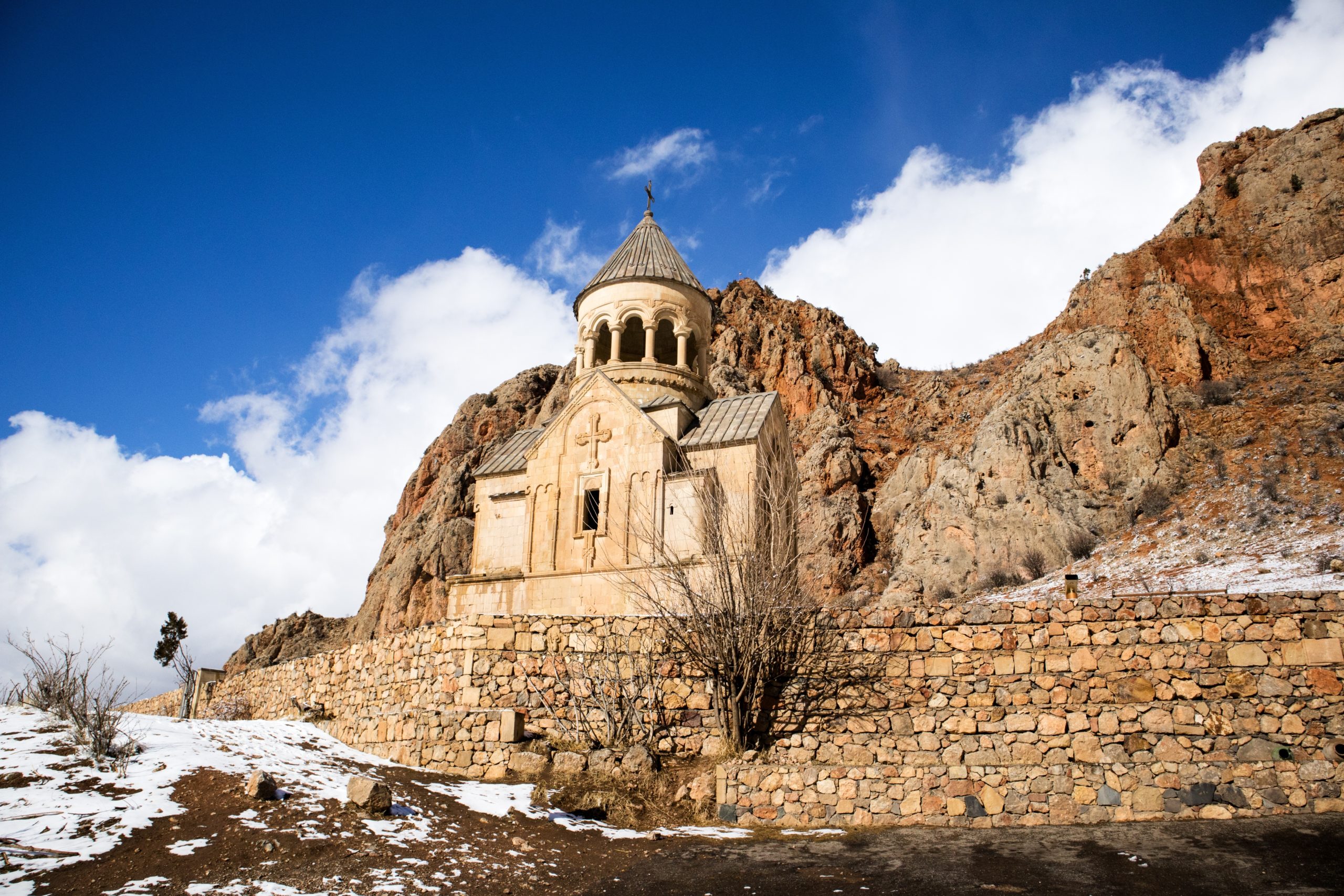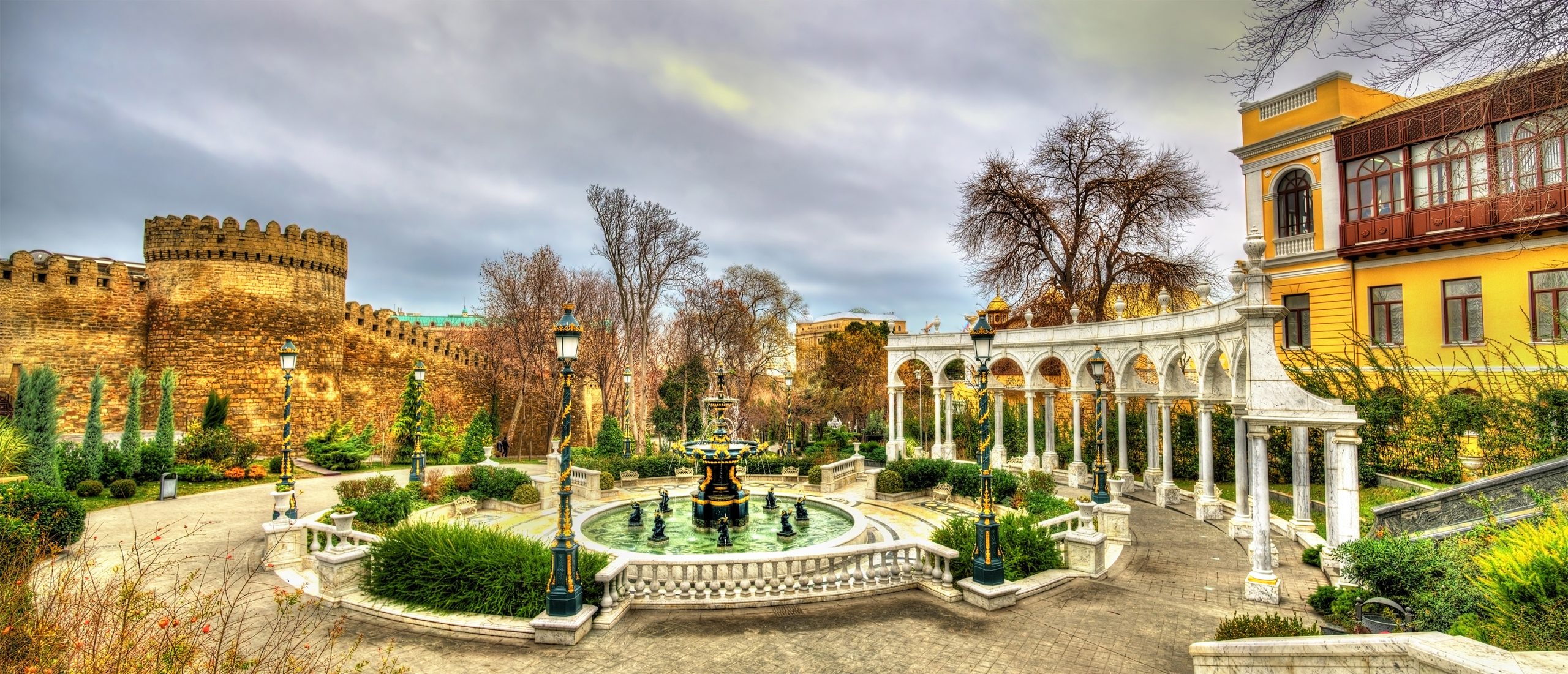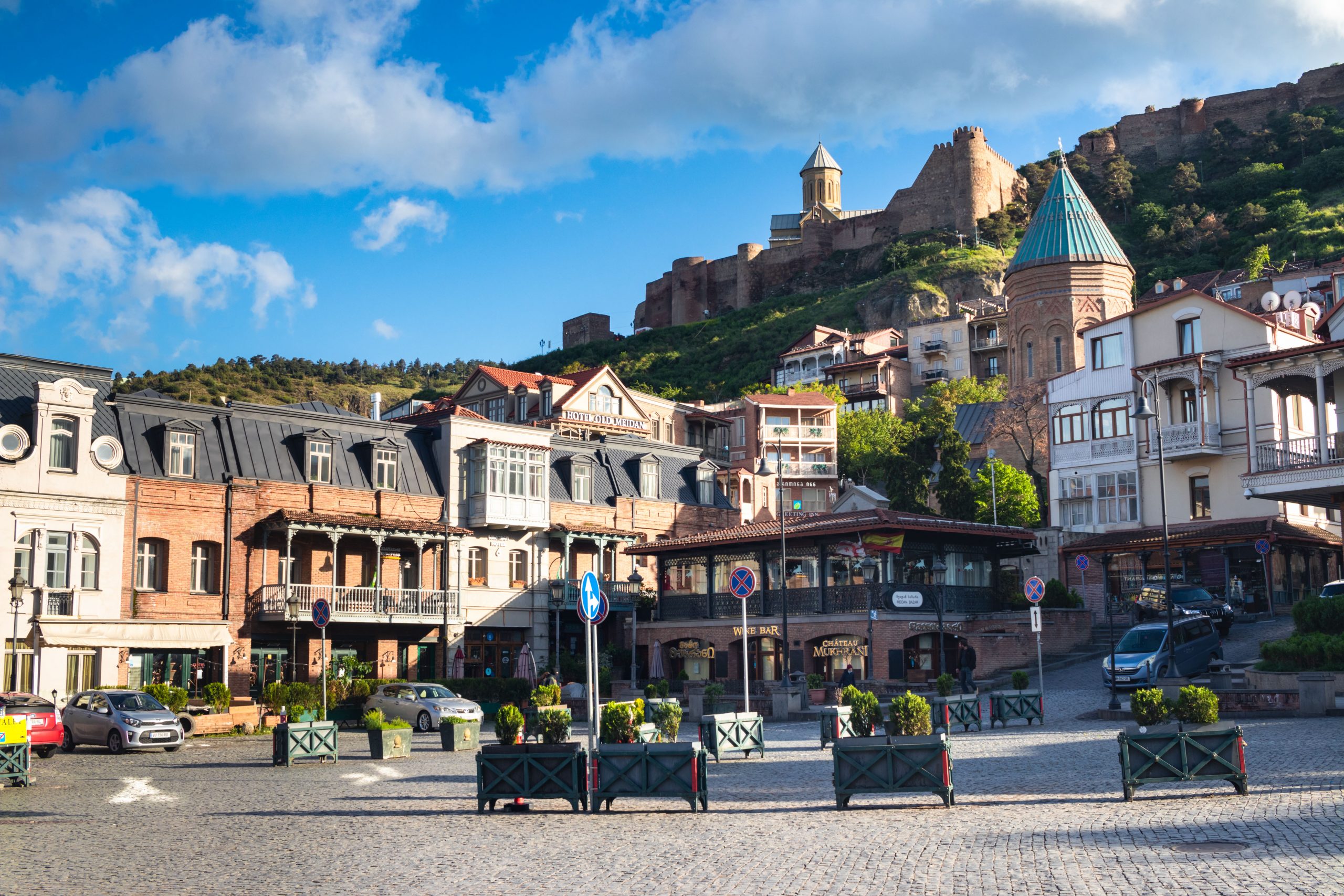Strategic Analysis Caucasus Brief
Bi-weekly review (7. 5. – 21. 5. 2023)
Tomáš Baranec
Armenia

Tatev, Armenia. Photo: Madrugada Verde/Shutterstock.com
Alleged Attempt to Kidnap Armenian Prime Minister’s Son Under Investigation
Haykakan Zhamanak, a newspaper owned by the family of Armenian PM Nikol Pahsinyan, wrote on May 17 that an attempt was made to kidnap the prime minister’s son Ashot. Gayane Hakobyan, the mother of a soldier who died in 2020 during the war in Karabakh, was arrested in connection with the case. She is a member of the Call of Sons NGO, founded by victims’ parents. Hakobyan is suspected of “attempting to kidnap” and is in jail. The defence filed a complaint with the court about the detention of the mother of the deceased soldier.
According to the data obtained by the investigation, Ashot Pashinyan met with the parents of the soldiers who died during the 44-day war in the courtyard of the Court of Appeal. The prime minister’s son was approached by the mother of one of them, who offered to sit in her car, which was parked nearby, and talk calmly. When Pashinyan got into the car, the car started, and the woman said that “they will drive further so that they are not interfered with.”
“In the car, the woman started talking about the 2020 war, territorial and human losses. Seeing that the latter was behaving inappropriately, exceeding the speed limit, and violating traffic rules, he demanded to stop the car to get out. The woman said that her son was taken away and killed without asking her, she had nothing to lose, and she could kill him. Therefore, without asking him, she will take him to Yerablur [the pantheon where the dead Armenian soldiers are buried], where, based on her emotions, will decide whether to let him go or not,” the investigative committee said in a statement.
On the way, when the car was not moving at high speed, Ashot Pashinyan jumped out. He was hit by a car following him and injured his leg. According to the Prime Minister’s son, the car also contained the parents of the fallen soldiers, whom he noticed at the courthouse.
Ruben Melikyan, who represents the interests of Gayane Hakobyan, claimed that her actions could not be qualified as kidnapping. According to the lawyer, no violence was committed against Ashot Pashinyan, he voluntarily got into the car, and Gayane Hakobyan “did not take any measures that would deprive him of the opportunity to get out of the car.”
Sources:
-
Hetq.am, „Attempted Kidnapping of Armenian PM’s Son, Claims Pashinyan Family Owned Newspaper“, https://hetq.am/en/article/156154
-
JAM News, „Attempted kidnapping of the Prime Minister of Armenia’s son: Human rights defenders’ comments“, https://jam-news.net/attempted-kidnapping-of-pashinyans-son/
Lavrov Says Armenia Should Have Accepted CSTO Observer Mission
In a lengthy interview with the Russian Tsargrad TV channel on global and regional security issues, Russian Foreign Minister Sergey Lavrov said the Armenian government’s last-minute decision to postpone sending a CSTO observer mission to the Armenian-Azerbaijani border was a mistake. Lavrov said CSTO was ready to assist Armenia in the face of Azerbaijani border incursions and that an agreement had been reached to send the mission. “At the CSTO summit in Yerevan in the fall of 2022, a document was prepared on deploying a mission of observers of the Collective Security Treaty Organization in Armenian territory, in accordance with the request of our Armenian allies,” Lavrov said. “If Yerevan had confirmed what was already agreed upon and ready for signing and coming into force, I am convinced that Armenia would have benefited and had a more stable situation.”
The Minister of Foreign Affairs of Russia emphasised that the aforesaid document was fully agreed upon at the level of foreign ministers of the CSTO countries. “Then, at the last moment, at the summit itself, the Armenian friends asked to postpone its adoption. Until now, it remains on paper and cannot be implemented,” Lavrov added.
On November 23, 2022, during the CSTO collective security council summit in Yerevan, Armenian PM Nikol Pashinyan announced that Armenia would not sign the CSTO declaration and the aid project to Armenia. According to Pashinyan, the reason was that the CSTO did not express a clear position on the Azerbaijani occupation of the sovereign territory of Armenia and did not condemn these actions. Moreover, Yerevan accused the CSTO of inaction for violating the territorial integrity of the member country and attacking the CSTO borders.
Lavrov chided the Armenian government for believing that the West would ensure the country’s security challenges if it removed Russian border guards and the Russian military base in Gyumri. Lavrov claimed he has proof that the US and its allies are actively making such proposals to Yerevan.
Sources:
-
MIRZOYAN Armen, Hetq.am, “Lavrov Says Armenia Should Have Accepted CSTO Observer Mission”, https://hetq.am/en/article/156145
-
News.am, „Lavrov: Armenia would have had a more stable situation if it deployed CSTO observers“, https://news.am/eng/news/760372.html

Noravank monastery in Areni, Armenia. Photo: Roninnw/Shutterstock.com
Detained Azerbaijani soldier sentenced to 11 years of imprisonment in Yerevan
Agshin Babirov, one of the two Azerbaijanis who crossed the border of Armenia in April 2023, has been sentenced to 11 years, six months and 15 days in prison, the Prosecutor General’s Office confirmed to Armenian News-NEWS.am. This Azerbaijani soldier was found guilty of illegally crossing the Armenian state border and illegally transporting firearms and ammunition across the border. Babirov has accepted the charges against him.
The criminal investigation in the case of Huseyin Akhundov, the other Azerbaijani who had crossed the Armenian border with Babirov, continues. In addition to the aforesaid charges, Akhundov is also accused of killing the Zangezur Copper-Molybdenum Combine security guard.
The Ministry of Foreign Affairs of Azerbaijan described the trial of Agshin Babirov, one of the Azerbaijani soldiers who crossed the Armenian border, as “falsified, the court’s decision is fictitious, and demanded Yerevan to release the soldiers.” “We have called on the international community, relevant international organisations and non-governmental organisations to exert serious influence and pressure on Armenia to release the Azerbaijani hostages as soon as possible and reunite them with their families,” the statement said.
Source:
-
News.am, “One of 2 Azerbaijanis who crossed into Armenia is sentenced to 11 years, 6 months, 15 days in prison“, https://news.am/eng/news/758888.html#:~:text=Agshin%20Babirov%2C%20one%20of%20the,Armenian%20News%2DNEWS.am.
-
Radar.am, “The Ministry of Foreign Affairs of Azerbaijan reacted to the verdict of Babirov who crossed the border of Armenia“, https://radar.am/en/news/world-2567122041/
EU hails progress after Armenia, Azerbaijan leaders meeting in Brussels
European Council President Charles Michel spoke of progress in talks between the leaders of Armenia and Azerbaijan in Brussels on May 14, adding that “momentum should be maintained” towards a final peace deal.
Prior to official negotiations, Michel met with Pashinyan on Saturday evening and Aliyev on Sunday morning. At the end of the meetings, the EU officials assured that the two leaders “shared a common willingness for the south Caucasus at peace,” describing their exchanges as “frank, open and result oriented”.
“On border issues, we reviewed progress and the next steps regarding the delimitation of the border. In this context, the leaders agreed on resuming the bilateral meetings on border issues. The leaders confirmed their unequivocal commitment to the 1991 Almaty Declaration and the respective territorial integrity of Armenia (29,800 km2) and Azerbaijan (86,600 km2). The ultimate delimitation of the border will be agreed through negotiations,” reads the statement.
The EU further wrote that on the topic of connectivity, both sides made “clear progress”, particularly on the reopening of the railway connections to and via Nakhchivan. “There has been an understanding on humanitarian issues that further detainees would be released in the coming weeks. I also stressed the need to safeguard the mutual understanding that soldiers who have simply got lost and crossed to the other side would continue to be released through a speedy procedure,” added Michel.
According to the Azerbaijani Ministry of foreign affairs statement, the meeting between Azerbaijani President and the Armenian Prime Minister was “useful for promoting the peace agenda “. Another meeting between Pashinyan and Aliyev was scheduled for June 1 in Moldova, involving French President Emmanuel Macron and German Chancellor Olaf Scholz.
Sources:
-
France 24, „EU hails progress after Armenia, Azerbaijan leaders meet“, https://www.france24.com/en/live-news/20230514-eu-hails-progress-after-armenia-azerbaijan-leaders-meet
-
European Council, Press remarks by President Charles Michel following the trilateral meeting with President Aliyev of Azerbaijan and Prime Minister Pashinyan of Armenia, https://www.consilium.europa.eu/en/press/press-releases/2023/05/14/press-remarks-by-president-charles-michel-following-the-trilateral-meeting-with-president-aliyev-of-azerbaijan-and-prime-minister-pashinyan-of-armenia/
-
Interfax, “Baku views Aliyev-Pashinyan meeting in Brussels as productive – Azerbaijani Foreign Ministry“, https://interfax.com/newsroom/top-stories/90489/
Energy crisis looms in Nagorno-Karabakh as reservoir levels fall
As de facto Nagorno-Karabakh continues to experience gas and electricity cuts in its fifth month under blockade, the region’s largest water reservoir faces depletion, threatening to leave the region without the hydroelectric power it depends on, reports OC Media. Representatives of the local de facto government officials announced on May 7 that the water volume of the Sarsang reservoir in northern Nagorno-Karabakh was at its lowest in 30 years. The reservoir’s water level has fallen by 25 metres since it became the primary source of electricity for over 120,000 people living in the region, which has been under blockade since December 2022.
Nagorno-Karabakh has relied on domestically produced electricity since January after wires carrying electricity from Armenia were damaged in areas under Azerbaijani control. Karabakh’s de facto leadership responded by restricting energy consumption and introducing daily power cuts. It was left to rely only on electricity generated by six hydroelectric plants that met less than a third of the Armenian-populated territory’s energy needs before the blockade. Baku’s subsequent disruption of Armenia’s gas supply to Karabakh further increased the load on the local energy network.
The United States, the European Union and Russia have repeatedly urged Azerbaijan to end the four-month blockade, which has also led to severe food shortages, medicine and other essential items in Karabakh. Baku has dismissed those calls. It went further late last month, setting up an official checkpoint on the sole highway connecting Karabakh to Armenia. The Armenian side condemned the tightening of the blockade as another gross violation of a Russian-brokered agreement that stopped the 2020 Armenian-Azerbaijani war.
Sources:
-
AVETISYAN Ani, OC Media, “Energy crisis looms in Nagorno-Karabakh as reservoir levels fall“,https://oc-media.org/energy-crisis-looms-in-nagorno-karabakh-as-reservoir-levels-fall/
-
Azatutyun.am, “Karabakh’s Energy Crisis Worsening“, https://www.azatutyun.am/a/32401755.html
Russia rewards Georgia with the lifting of visa requirements and renewal of direct flights
Russia has restored visa-free travel for Georgians while lifting a ban on direct flights between the two countries. The moves are widely seen as a Kremlin reward for the Georgian government’s restrained approach to the war in Ukraine while also serving as a tacit recognition that Georgia is an essential node of sanctions-busting trade for Russia, writes Eurasianet.org.
According to a May 10 decree issued by Russian leader Vladimir Putin, Georgians will be allowed to visit Russia for up to 90 days without a visa. The new rules were set to go into effect on May 15. The 90-day limit set by Russia is the same timeframe that Georgians can spend in the European Union without a visa.
Meanwhile, the Transport Ministry in Moscow announced that Russian airlines would operate seven direct flights a week flying between the Russian and Georgian capitals, restoring the connection after a four-year hiatus. In addition, the Russian Foreign Ministry lifted an advisory against Russian citizens travelling to Georgia.
The Prime Minister of Georgia, Irakli Gharibashvili, commented on May 11 regarding the cancellation of the visa regime with Georgia and the restoration of direct flights with Russia, “From a humanitarian point of view, everything and every decision that will make life, movement, and doing business easier for our citizens are, of course, positive and welcome.”
Gharibashvili repeated that 1 million ethnic Georgians live in Russia, with family members, relatives, and relatives in Georgia, and that “it is very important to facilitate movement, their movement, the arrival of their relatives, etc.” He also added that in addition to the fact that the restoration of direct flights with Russia will remove “huge inconvenience” and expense for Georgian citizens in terms of movement, it is also a constituent part of trade and economic relations, “one small component, a detail, not the main one.” “We have trade and economic relations with Russia, it is the merit of our government that trade with Russia has also been restored, and the previous government strived for this, for which they did everything,” he emphasised, adding that many other countries, including China, Israel, have direct air connection with Russia.
A joint statement by the Georgian opposition has been published in response to restoring direct flights between Russia and Georgia. The statement, which six opposition parties signed, says that “Georgia is on the verge of international isolation and being left without allies and with the enemy — Russia.”
The statement’s authors called on Georgian society to “say together again, clearly and loudly: no cooperation with the enemy, no to the Russian government, together with Europe!” “We, the democratic, pro-Western political parties of Georgia, will do everything to democratically change this regime (“Georgian Dream”), to protect Georgia from international isolation and Russian encroachments on freedom and state sovereignty, so that our country, which is at the crossroads of history, irreversibly embarked on the path of de-occupation, integration into the EU and NATO,” the statement reads.
The statement was signed by the United National Movement, European Georgia, Elene Khoshtaria – Droa, Girchi – More Freedom, Lelo and Strategy Aghmashenebeli. Moreover, Georgian President Salome Zourabichvili characterised Russia’s actions as a provocation designed to frustrate Georgia’s EU integration ambitions. “Resuming direct flights and lifting the visa ban with Georgia is unacceptable as long as Russia continues its aggression on Ukraine and occupies our territory!”, Zourabichvili wrote in a Twitter post.
Four protests have taken place in Georgia’s capital in the week following the Kremlin’s decision, with those speaking out expressing concerns over Georgia’s prospects of EU integration and the country growing closer to Russia. The first was organised by the youth wing of the opposition United National Movement, a second “performance protest” by the European Georgia party, and a third, which attracted the largest number of attendees, was organised by a mix of liberal and opposition groups.
On May 19, the Georgian police detained a reported six activists near Tbilisi International Airport as around 200 people protested the arrival of the first passenger flight from Russia to Georgia.
Sources:
- KINCHA Shota, OC Media, „Protesters detained as first Russia–Georgia flight lands in Tbilisi“. https://oc-media.org/around-200-people-gathered-to-protest-the-resumption-of-flights-between-russia-and-georgia/
- LOMSADZE Giorgi, Eurasianet.org, „Russia rewards Georgia with lifting of visa requirement, renewal of direct flights“, https://eurasianet.org/russia-rewards-georgia-with-lifting-of-visa-requirement-renewal-of-direct-flights
- Caucasus Watch, „Georgian Government’s Response to Resumed Flights with Russia Under Scrutiny by US“, https://caucasuswatch.de/en/news/georgian-governments-response-to-resumed-flights-with-russia-under-scrutiny-by-us.html
- JAM News, “Georgian opposition statement: Country on the verge of international isolation“, https://jam-news.net/georgian-opposition-statement/
- KINCHA Shota, OC Media “‘Russian aircraft won’t land us in the EU’ — Georgians protest upcoming flights with Russia“, https://oc-media.org/russian-aircraft-wont-land-us-in-the-eu-georgians-protest-upcoming-flights-with-russia/

Gergeti Trinity Church, Georgia. Photo: irisphoto1/Shuterstock.com
Georgian Dream says it leaves PES due to ideological differences
On May 11, Irakli Kobakhidze, the Chair of the ruling Georgian Dream party, announced the group was leaving roles it had held in the Party of European Socialists since 2015, citing an “unacceptable ideological transformation” of the latter and its criticism aimed at GD’s participation in the Conservative Political Action Conference (CPAC) in Budapest last week.
Kobakhidze said PES, where GD has held an observer status, had voiced criticism of Georgian Dream officials’ participation in the CPAC – where Prime Minister Irakli Gharibashvili delivered a keynote address – and issued “public threats of reviewing [our] cooperation” without prior communication with the Georgian party.
“Our conservative political platform was criticised by the leadership of the PES, of which Georgian Dream is an observer member. Moreover, there were threats from their side to reconsider cooperation, which was not preceded by communication. Such attitudes are fundamentally unacceptable to us. Our party has been an observer member of the PES since 2015. Unfortunately, from 2015 to the present, the Party of European Socialists has not made a single loud statement in support of the Georgian Dream but has regularly joined political campaigns in support of the radical opposition,” Kobakhidze said.
He also noted that last and this year, several dozen MEPs from the Party of European Socialists supported “absurd resolutions” that demanded that the European Parliament impose sanctions on the party’s founder Bidzina Ivanishvili and release “two criminals”, Mikheil Saakashvili and Nika Gvaramia, and stop criminal prosecution against the “other criminal”, David Kezerashvili. He added that the PES „has increasingly moved away from the classical, social democratic ideology and switched to a pseudo-liberal platform“.
Gharibashvili responded to the decision to withdraw from the Party of European Socialists while talking to the press and said that “this party, this union, has slowly transformed and our paths have diverged, the same [happened in the] ideological part, the same in their politics, their statements, their support.” He also emphasised that the “Georgian Dream” had “zero support” from the PES.
Earlier, the Party of European Socialists condemned Gharibashvili’s speech in Hungary and noted that the issue of suspending the status of the Georgian Dream would be considered at the next session, which is a “necessary step”. Gharibashvili spoke at an annual conference of conservative political action in Budapest, where he said that the Hungarian people were very lucky to have “such a wise and far-sighted” leader – meaning Viktor Orbán. According to him, the forces opposed to the truth are trying to achieve their goals with the help of LGBT propaganda.
Sources:
- Agenda.ge, „Ruling party to leave Party of European Socialists citing “ideological transformation”, criticism“, https://agenda.ge/en/news/2023/1855
- JAM News, “Georgian Dream will leave the Party of European Socialists on its own, without waiting for exclusion“, https://jam-news.net/georgian-dream-withdraws-from-pes/
- Civil.ge, “GD Says it Departs PES Due to Ideological Differences“, https://civil.ge/archives/541814



Contact us